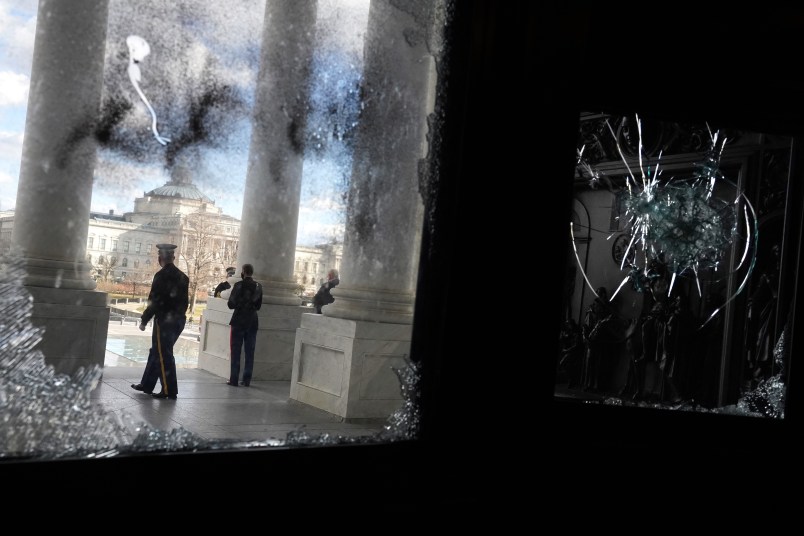Former senior national security officials, members of the military and elected officials called in a new letter for Congress to establish a January 6 commission, driven primarily by their collective fear of the “exigent and growing threat” of domestic terrorism in the United States.
They acknowledged that January 6 was a massive security meltdown at the Capitol, and a sign of the lack of preparedness for similar attacks in the future. But it was also, they wrote, a signal of something festering deeper.
“January 6th was also the result of complex national security threats,” they wrote. “These include coordinated disinformation campaigns, nontransparent financing of extremist networks, potential foreign influences, and white supremacist violent extremism.”
Some high-profile names who signed the letter include former Director of National Intelligence James Clapper, former Senator Tom Daschle (D-SD), former Defense Secretary Chuck Hagel and former U.S. Ambassador Marie Yovanovitch.
The officials encouraged legislative or executive branch action, as well as that of law enforcement, in tandem with the commission.
“Given the gravity of January 6th as a national security matter — the violent disruption to the transition of power and the continuing threat of future attacks — a national commission examining the lead up to the January 6th assault, and the attendant security lapses, is not only appropriate, but a critical component of the national response,” they wrote.
The effort has been stalled in Congress for the past couple months. House Speaker Nancy Pelosi (D-CA) drew up the proposal in mid-February, but Republicans immediately balked at the uneven party commissioner split (something Pelosi has indicated she’d be willing to cooperate on) and the scope of the probe. On the second point of contention, the two sides appear to remain at an impasse.
Republicans are ardently against a commission digging into the events leading up to the attack on the Capitol, the catalyst the former officials underscore as critically important in their letter. GOPers want the probe to focus on the security failures on January 6 alone, which so far has been reflected in committee hearings on the subject, few of which have ventured out of those bounds.
The second impeachment trial has been the most expansive exploration so far into the months of election fraud conspiracy peddling by former President Donald Trump that revved up the mob to ultimately storm the building and try to stop the election from being “stolen.” But even then, the impeachment managers purposefully left Trump’s GOP allies, many of whom were just as culpable, out of the accounting so as to not alienate potential Republican conviction votes.
That divide has so far been impossible to span, and is the primary factor that makes this situation so different from the aftermath of the 9/11 attacks. The officials hold up the 9/11 commission in their letter as the model for which this commission should strive, a bipartisan undertaking in the wake of a violent act of terrorism. But, while there were issues in getting true accountability amid the partisan headwinds then too, those gusts blow even stronger now when Republicans have such a vested interest in avoiding blaming Trump and themselves.
As experts told TPM, there are really only two options: Republicans could appoint diehard Trump firebrands to the commission, who will refuse to place any blame on the President and his allies. Or they could appoint more old-school Republicans who, while being potentially more willing to pin the attack on Trump, would likely lack credibility with the GOP base, much of which is still loyal to the former President.
Some experts TPM spoke with still argued in favor of a commission, even if it’s riven by partisan interests, in the interest of cobbling together a decisive historical record of what went wrong.
That argument may gain strength in the face of Republican attempts to rewrite history around the attack. Both Trump and Sen. Ron Johnson (R-WI) have favored the “it wasn’t really so bad” approach, with Trump insisting that his supporters were “zero threat” and that they really went in “hugging and kissing” the officers. Johnson has said that it “didn’t seem like an armed insurrection” to him.
Others, like House Minority Leader Kevin McCarthy (R-CA) and Senate Minority Leader Mitch McConnell (R-KY) clung to the contested election in Iowa’s second district to muddy the waters, false claiming that the Democrat’s claim was on par with Trump’s numerous attempts to throw out thousands of votes and overturn the election. The Democrat in that case, Rita Hart, last week dropped her election challenge due to that “toxic campaign of political disinformation,” leaving Republicans casting about for a different way to exculpate themselves after the attack that left five dead and hundreds arrested.







“Hugging and kissing”
They loved officer Brian Sicknik to death.
That’s not exactly what the headline suggests:
If it happens, its going to be a Repuglican clusterfuck, don’t see how to avoid it.
" Ex-Bigwigs In Military, Nat Sec World Implore Congress To Press On With Jan. 6 Commission"
I’d actually implore AG Garland to press on with a Jan. 6 Special Prosecutor.
Just like you’d do with accomplices to a bank heist - ask them what to focus the investigation on and then be surprised when they wanted to focus on security lapses and how the team got away with it.
Why on earth is this even a question?